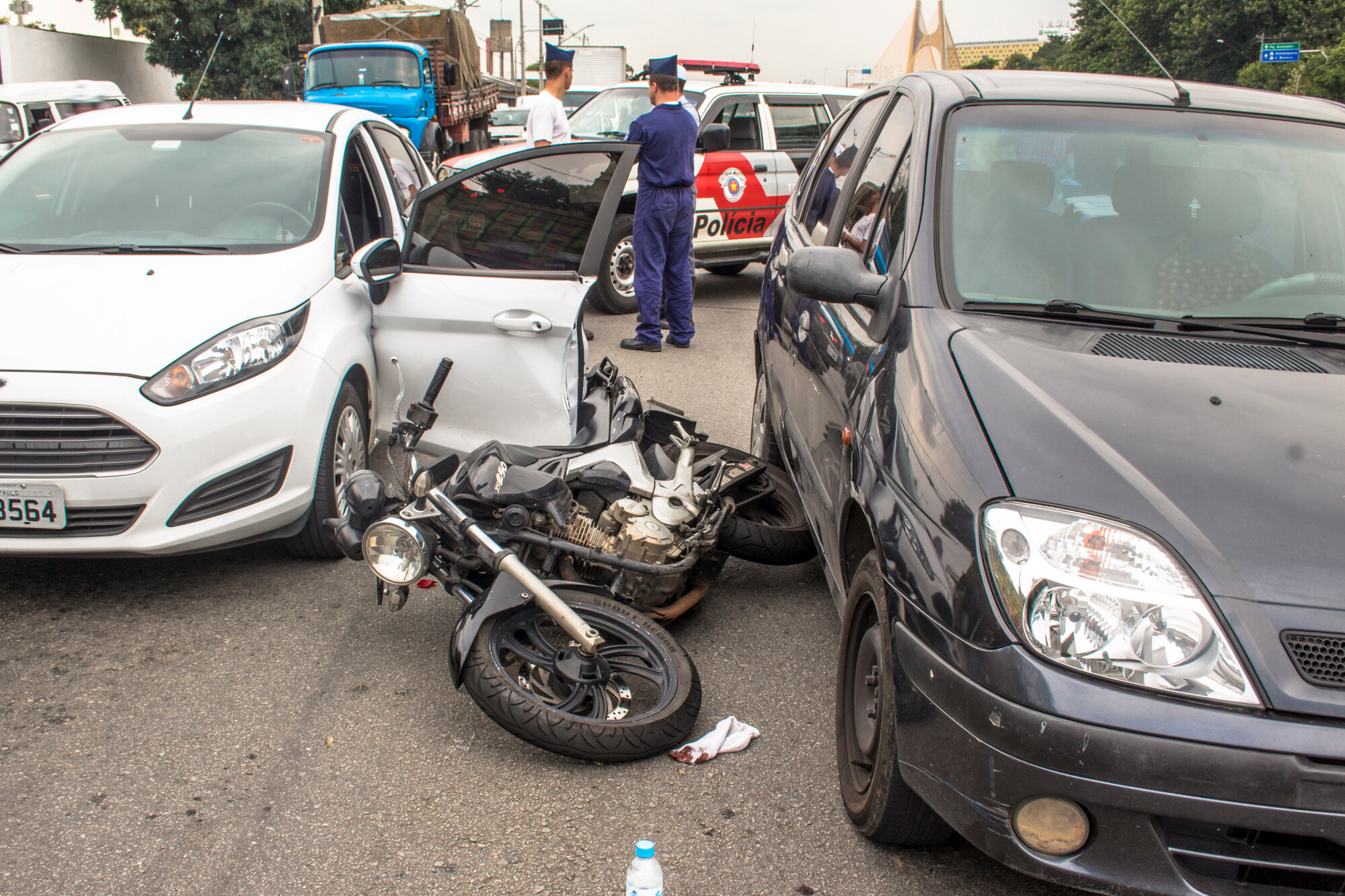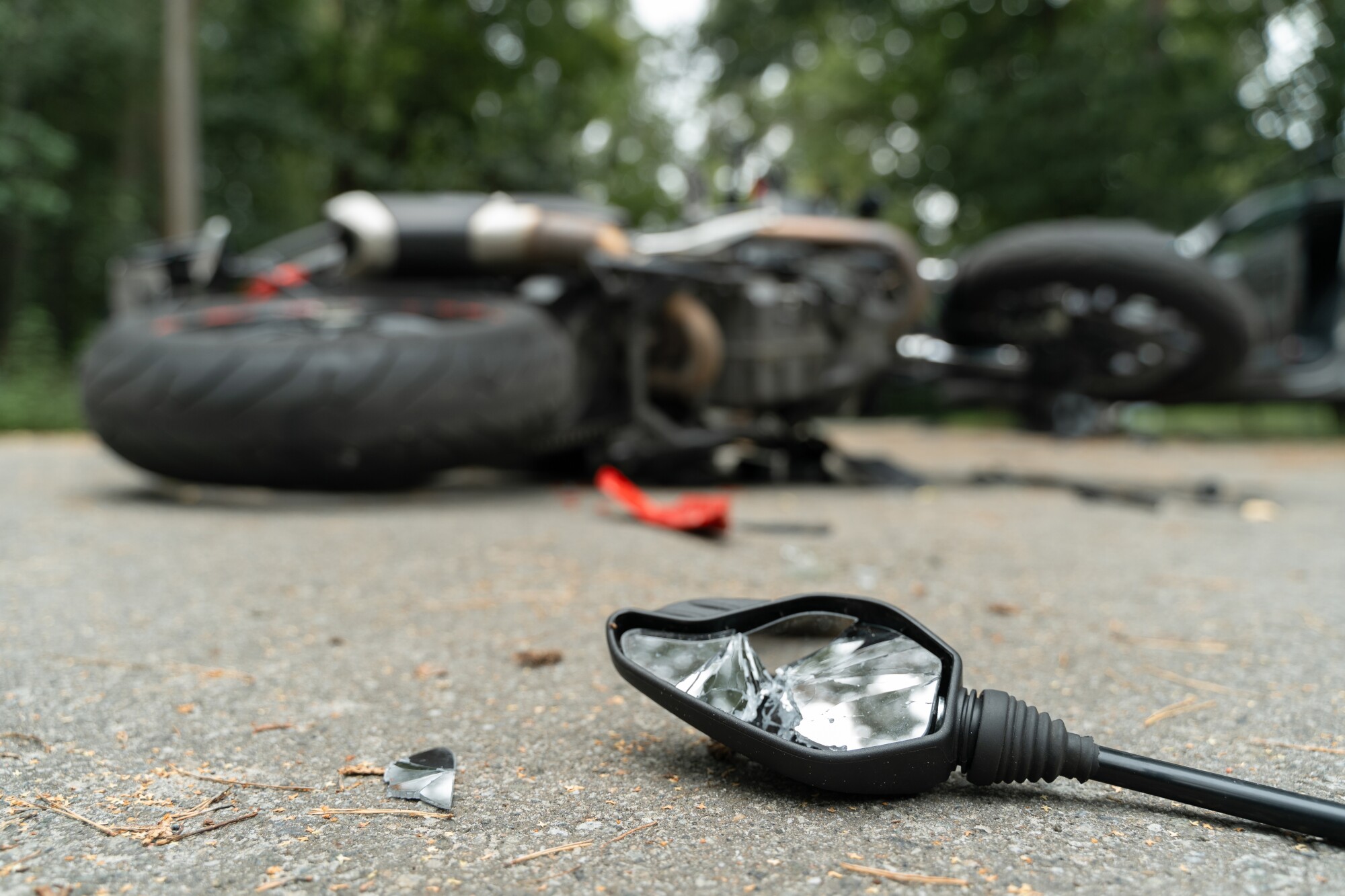
Negligent drivers often cause motorcycle collisions by failing to yield, running red lights, engaging in distracted driving, or making unsafe lane changes. These actions lead to serious accidents, with common injuries including broken bones, head trauma, spinal cord injuries, road rash, and internal injuries. Motorcyclists are particularly vulnerable due to their lack of physical protection while riding.
If you suffered injuries in a motorcycle accident, a skilled lawyer can investigate your crash circumstances, gather evidence, and negotiate with insurance company adjusters. They can also represent you in court if necessary, ensuring that you receive fair compensation for related medical expenses, lost income, pain and suffering, and other damages.
Having a knowledgeable motorcycle accident lawyer in St. Louis on your side significantly increases your chances of a successful outcome.
How Do Motorcycle Crashes Result From Others’ Negligence?
Motorcycle crashes frequently occur due to the negligence of other drivers. Motorcycles are smaller and less visible than other vehicles, making riders more vulnerable to the mistakes of others. The following examples are the most common ways such accidents happen, along with the types of crashes that can result.
One of the most frequent causes of motorcycle collisions is drivers failing to see motorcycles. This type of crash often happens when a driver changes lanes without properly checking their blind spots.
Motorcycles can hide in blind spots due to their size, leading to sideswipe collisions. Similarly, distracted driving – such as texting, eating, or adjusting the radio – reduces a driver’s awareness and increases the chances of colliding with a motorcycle.
Left-turn collisions are another major type of crash. These collisions occur when a driver turns left at an intersection without noticing an oncoming motorcycle.
Because motorcycles are smaller and appear farther away than they are, drivers often misjudge their speed or fail to notice them entirely. This negligence can result in devastating T-bone or head-on collisions.
Rear-end collisions are also a common type of motorcycle crash due to negligent drivers. Unlike cars, motorcycles cannot absorb the same level of impact in rear-end crashes.
A distracted or tailgating driver who fails to stop in time can cause the motorcyclist to be thrown from their bike, often resulting in severe injuries.
Another way negligence causes motorcycle collisions is when drivers ignore traffic laws, such as by running red lights or failing to yield.
Motorcyclists who have the right-of-way can be struck when other vehicle drivers fail to stop or follow the rules of the road. These crashes are particularly dangerous because motorcyclists have less protection than car occupants.
Finally, drunk or impaired driving is a significant factor in motorcycle accidents resulting from negligence. Impaired drivers have slower reaction times and poor judgment, increasing the risk of hitting a motorcyclist.
Such collisions often lead to catastrophic outcomes, including high-speed collisions or fatal crashes.
What Are the Most Frequent Injuries in Motorcycle Crashes?
Motorcycle crashes can result in a wide range of injuries, many of which are severe due to the lack of physical protection for riders. Unlike car occupants, motorcyclists are exposed to the full force of impact during an accident.
The following are some of the most frequent injuries that victims of motorcycle crashes may suffer:
- Road Rash ̶ One of the most common injuries is road rash. Road rash occurs when a motorcyclist slides across the pavement, causing the skin to scrape against the rough surface. Road rash can range from scrapes to deep wounds, and severe cases may lead to infections or permanent scarring. Protective gear like jackets and gloves can reduce the severity of road rash, but it remains a frequent injury in crashes.
- Head Injuries ̶ Head injuries are another significant concern for motorcyclists. Traumatic brain injuries (TBIs) can occur if a rider’s head strikes the ground, another vehicle, or any solid object. Even with a helmet, motorcyclists are at risk of suffering concussions, skull fractures, or brain trauma, which can lead to long-term cognitive or physical impairments.
- Broken Bones ̶ Broken bones are also common in motorcycle crashes. The impact of a crash or the force of landing on the ground can cause fractures in the arms, legs, ribs, and pelvis. Wrist and hand fractures often happen when riders instinctively use their hands to break their fall. Severe fractures may require surgery or extensive rehabilitation.
- Spinal Cord Injuries ̶ Spinal cord injuries are another devastating outcome of motorcycle crashes. Damage to the spinal cord can lead to partial or complete paralysis, depending on the location and severity of the injury. These injuries are life-altering and often require long-term medical care.
- Internal Injuries ̶ Internal injuries, such as damage to organs or internal bleeding, are less visible but equally serious. These injuries may occur from blunt force trauma or the impact of being thrown from the motorcycle. Without immediate medical attention, internal injuries can be life-threatening.
- Emotional Distress ̶ Finally, motorcyclists often suffer from psychological injuries such as post-traumatic stress disorder (PTSD). The emotional toll of a serious collision can lead to anxiety, depression, and difficulty returning to riding.
How Do You Prove Negligence in a Motorcycle Accident Case?
A motorcycle accident case must prove negligence for a plaintiff to obtain compensation for injuries and damages.
Negligence occurs when someone fails to take reasonable care, resulting in harm to another person. To prove negligence in a motorcycle crash case, you must establish duty of care, breach of duty, causation, and damages.
The first element of negligence is establishing that the defendant (the person being sued) owed a duty of care to the motorcyclist.
In the context of a motorcycle accident, all drivers have a duty to drive safely and follow traffic laws. This duty includes paying attention to road conditions, obeying speed limits, and not driving under the influence of drugs or alcohol.
In short, every driver must take reasonable precautions to avoid harming others.
Once the plaintiff proves the defendant owed a duty of care, they must prove the defendant breached that duty. A breach occurs when the defendant’s actions or failure to act falls below the standard of care expected of a reasonable person.
For example, if a driver runs a red light or makes an unsafe lane change without signaling, that can be considered a breach of duty. In a motorcycle collision case, showing that the defendant’s actions were reckless or careless can prove a breach of duty.
Causation is the third element, and it focuses on linking the defendant’s breach of duty to the injuries the motorcyclist sustained. In other words, the motorcyclist must prove that the defendant’s actions directly caused the crash and the resulting injuries.
For example, if a driver fails to stop at a red light and hits a motorcycle, causing the rider to fall and suffer injuries, the motorcyclist must show that the driver’s failure to stop was the direct cause of the crash. In this scenario, eyewitness testimony, police reports, or traffic camera footage can prove causation.
The final element of negligence is proving that the motorcyclist suffered damages due to the accident.
Damages refer to physical injuries, medical expenses, lost wages, pain and suffering, or property damage the crash caused. The motorcyclist must show evidence of these damages, such as medical records, bills, or testimony from healthcare professionals.
Will a Motorcycle Accident Case Go to Trial?
Several factors can influence whether a motorcycle accident case will go to trial. Not every case ends up in court. Most resolve through settlements or alternative dispute methods. However, the circumstances of the collision, the parties involved, and your personal injury attorney’s strategies all determine if a motorcycle accident case will proceed to trial.
One of the biggest factors is the severity of the injuries and damages the motorcyclist sustained. If the injuries are serious, such as brain trauma, spinal cord injuries, or multiple fractures, the stakes of the case increase.
Insurance companies often play a significant role in determining whether a case goes to trial. If the insurance company offers a settlement that the motorcyclist finds reasonable, the case may settle without trial.
However, if the offer is too low or the insurance company refuses to provide fair compensation, the motorcyclist may reject the offer and proceed to trial. Insurance companies are generally interested in saving money, so they may push for a settlement if the motorcyclist has a strong case.
The strength of the evidence also affects whether a case goes to trial. If the evidence clearly supports the motorcyclist’s version of events, such as police reports, witness testimony, or video footage, the defendant may be more likely to settle. However, if the evidence is weak or unclear, a trial may need to sort out the facts and determine liability.
Finally, the legal strategy and goals of both parties influence whether a case goes to trial. Some motorcycle accident attorneys may prefer to go to trial if they believe they can win a larger judgment. On the other hand, defendants may want to avoid the expense and risk of a trial, leading them to settle.
Common Types of Damages in Motorcycle Accident Cases
Victims of motorcycle accidents may be eligible to receive various types of damages in their personal injury claims or lawsuits. These damages compensate the injured party for the harm they suffered from the accident.
One of the most common damages in a motorcycle crash case is medical expenses, including the costs of immediate treatment, such as emergency room visits, surgeries, and hospital stays. It also covers long-term medical care like physical therapy, rehabilitation, and any ongoing treatments required due to the injuries. Medical expenses can quickly add up, and victims may obtain reimbursement for both past and future medical costs.
If the motorcyclist cannot work because of their injuries, they can also seek compensation for lost earnings. This compensation includes both the income they have lost during their recovery period and any future earnings they may miss if their injuries prevent them from returning to work.
For example, if a rider cannot work for several months or suffers a permanent disability that affects their ability to work in the future, they may be entitled to compensation for these lost earnings.
In addition, pain and suffering damages are meant to compensate the victim for the physical pain, emotional distress, and mental anguish they experience due to the accident and its aftermath.
This damage includes the pain from injuries, the emotional toll of dealing with the trauma, and the effect on the victim’s quality of life. While these damages are harder to quantify than medical bills or lost income, they are an important part of many motorcycle collision claims.
Furthermore, motorcycle crashes often result in significant damage to the bike and other personal property. Victims can seek compensation for the cost of repairing or replacing their motorcycle, as well as for any other damaged property, such as helmets, clothing, or electronics. Property damage is typically easier to calculate due to receipts and estimates for repairs or replacement.
In addition to physical pain and suffering, motorcycle accident victims may experience emotional distress, including anxiety, depression, or PTSD. This condition can result from the trauma of the crash itself or the long-term consequences of the injuries. Victims can seek compensation for the emotional toll and the costs of mental health treatment such as therapy or counseling.
Besides that, loss of consortium damages are available when the injured party’s spouse or family members suffer from the repercussions of the crash. This type of damage can include the loss of companionship, affection, or support due to the victim’s injuries.
Finally, in some cases, if the defendant’s actions were particularly reckless or intentional (such as driving under the influence), the court may award punitive damages. These damages punish the defendant and deter others from engaging in similar behavior.
Contact an Experienced Motorcycle Accident Lawyer Right Away
If you suffered injuries in a motorcycle collision that a negligent driver caused, you may be eligible for compensation via a personal injury claim or lawsuit. Your personal injury attorney in St. Louis will aggressively fight for your interests during settlement negotiations or in court to maximize your compensation and help you become whole again.





 RSS Feed
RSS Feed